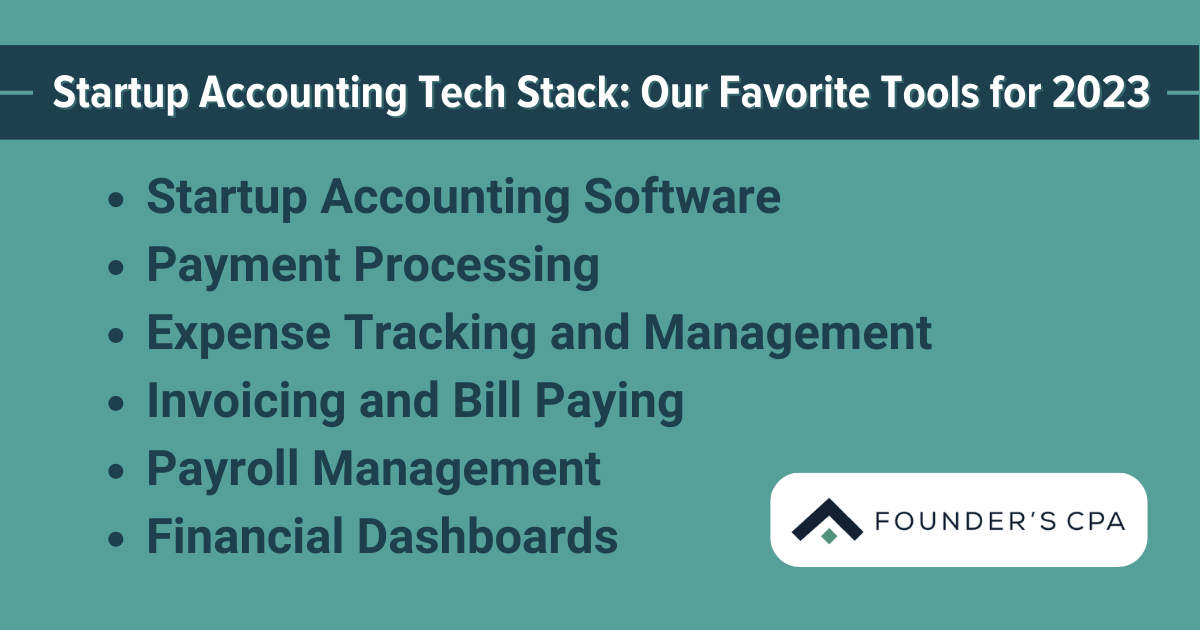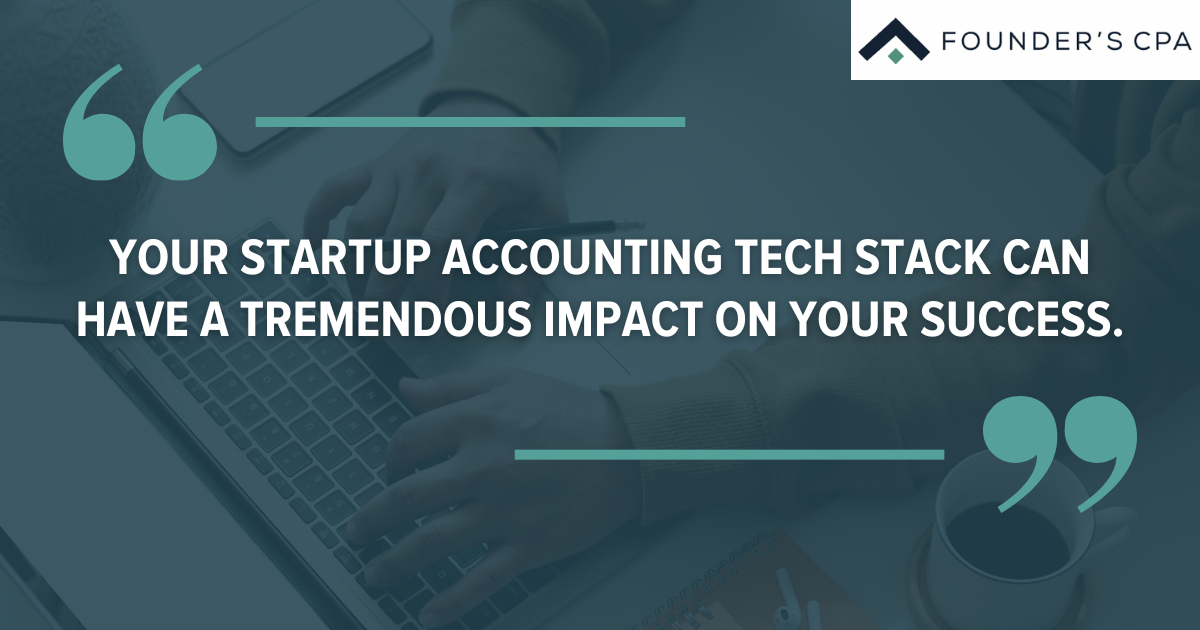An accounting tech stack is the range of software products, tools, and services that a startup uses to power its business.
At the beginning of a business’s life, startup accounting is often managed by the owner or an employee.
As with most things, using the proper tools makes the job easier, especially in accounting, as a business gets larger and more complex. Most founders should consider a startup finance tech stack to simplify financial processes and steer the company in the right direction.
As minor details can make or break your young company, getting your tech stack right is crucial for business success. The tools, systems, and processes you use at the beginning can shape your company for years to come.
Look at our favorite tools for a startup accounting system in 2023.

The Basics of a Good Startup Accounting Tech Stack
The massive growth of SaaS tools for everything from accounting and forecasting to sales and customer relationship management (CRM) means there’s a tool (or three) out there for pretty much every aspect of your business. As your business grows and needs change, so will a startup’s accounting technology stack.
Before getting too advanced, it’s helpful to understand the basics of good accounting software that fits your business.
Startup Accounting Software
Early-stage companies often rely on manual processes and spreadsheets for their accounting, which can be time-consuming and error-prone.
Accounting software can help simplify, standardize, and automate financial processes. Many potent modern accounting tools are affordable, easy to use, and can scale with your business.
Using these tools to pay bills, accurately manage cash flow and inventory, and track expenses and sales can make your processes more efficient and your financial figures more accurate, ultimately saving time and money.
Considering accounting software over a manual method of accounting can help you leverage data to run your business more efficiently.
Quickbooks
QuickBooks allows you to record your company’s financial transactions, track your profits and losses, and generate reports to make business decisions. It has a clean and simple interface that enables even new users to use it easily.
Benefits of QuickBooks include:
- Easy to use – QuickBooks is easy to learn and use. It’s an intuitive system that allows you to start using it in about an hour.
- Cost-effective – a basic version of the software starts at around $15 per month.
Xero
Xero is a cloud-based accounting software that helps small to medium-sized businesses manage their finances. It has all the features of a traditional accounting system, but it’s built on the Internet so you can access it anytime.
Ît can be used to track income and expenses, pay your bills, and keep track of your books. The service also offers helpful tools for invoicing clients.
The benefits of using Xero include the following:
- It has an easy and intuitive interface.
- It’s secure – your data is stored on the cloud, so there are no vulnerable local servers for cybercriminals to hack into.
Payment Processing
Manually handling hundreds or thousands of payments can be a nightmare. Automating payment processing is one of the easiest ways to save time and money.
Automated payment processing helps you save time and costs by eliminating the need for manual data entry. Some accounting tools even offer automatic reminders for upcoming bills, and there are many SaaS tools to deal with late and missed payments.
Stripe is a popular payment processing company that helps businesses to integrate payment acceptance, online and mobile payments, and subscription billing. It also provides software libraries and developer tools to allow customer payments worldwide.
Expense Tracking and Management
Even well-funded companies would be wise to track and manage expenses. Tools in this realm help you closely track spending and optimize your finances.
Expensify is one of the best online expense-tracking tools available. It allows users to maintain transparency around what, where, and how much they’re spending. Growing startups need this information for understanding what you’re spending and why you’re spending it.
Below are some benefits of using Expensify:
- Streamlined expense reporting – Expensify allows employees to submit their receipts electronically for approval. They can attach photos of their receipts, saving time and eliminating the errors that often pop up through manual data entry.
- Easy reimbursement – using Expensify as your company’s expense management software means employees can submit reimbursable expenses directly from the app. They’ll also be able to carefully monitor their budgets!
Invoicing and Bill Paying
Invoicing and bill paying are critical components of the business cash cycle. Careful monitoring of these elements allows you to easily manage your business’s cash position.
Plus, professional invoicing lets you show off some of your work and increase your business’s credibility.
Bill.com offers invoicing and payments for small businesses, which makes it easier to manage your company’s finances from one place. This is especially helpful for employees who work on multiple projects simultaneously, allowing them to invoice clients from one place and get paid from another – no need for duplicating effort between departments!
Payroll Management
Employees are at the heart of many businesses, and payroll management is a critical component in keeping them happy and your business running smoothly. These tools assist in managing payroll and benefits for employees and contractors and cover:
- Calculating and paying employee wages
- Tax deductions and contributions
- Issuing payslips
- Preparing reports
- Filings for government agencies
Streamlining your payroll functions saves time and money. One of the best ways to simplify your payroll functions is by using Gusto.
Gusto is an online payroll software that makes it easier to manage all your payroll needs in one place. It offers various benefits, such as:
- Easy setup – the setup process is simple. Start by entering basic information about yourself and your business and Gusto will take care of everything else.
- Convenient – Gusto’s interface is user-friendly and cloud-based, so you can access it from anywhere, anytime you need it.
- Affordable – Gusto offers affordable pricing plans that fit every budget.
Financial Dashboards
A dashboard is a management tool showing a collection of your most important financial KPIs. They’re a great way to see how your business is doing since they often leverage financial analytics to help you spot trends. In short: dashboards help you make better data-driven decisions based on what’s happening now and in the future.
Some great dashboarding tools are:
Jirav – lets you create a customizable dashboard for your team’s metrics. It includes features like goals, graphs, reports, and KPIs. The platform allows you to track everything from the number of new customers to average daily sales.
Spotlight – allows users to visualize data in an easy-to-read format. The platform includes built-in analytics tools and an API that enables users to integrate their existing data into Spotlight’s interface.

Need Help Building a Startup Accounting Tech Stack?
Your startup accounting tech stack can have a tremendous impact on your success. Whether you’re just starting out or transitioning to a more mature phase, your financial tools, processes, and systems can have a significant impact on your business.
The startup finance experts at Founder’s CPA know this and can help you address some of these issues. From defining and implementing the right tech stack for your startup or handling your company’s income tax filings, our team has the right tools to help your business grow.
Contact us today to get started on your accounting tech stack.




